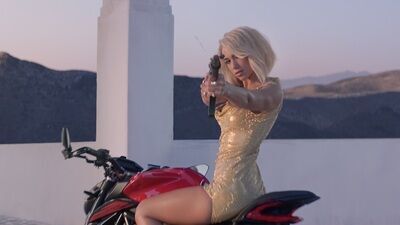Jason Fuchs’ script retains a steady pace as he develops the spoof: Afflicted by writer’s block, with her cat Alfie, Elly boards a train to see her mother (Catherine O’Hara). On board, she meets Aidan (Sam Rockwell). The scruffy stranger isn’t the dashing Argylle; he’s a believable spy, someone who can easily blend into the background. POV shots from Elly’s eyes lead to a nifty editing trick, in between blinks Rockwell’s visage becomes Cavill’s face, blending reality with fiction.
Aidan is here to extract the nervous spy novelist; assassins sent by Director Ritter (Bryan Cranston), the head of the undercover agency called the Division, believe she knows the whereabouts of a flash drive containing classified material. Why is she their target? Unbeknownst to Elly, the details of her novels match several real missions that make one think she might be undercover. For a while, as Elly and Aidan work to recover the drive, the thin plotting is enough. The film feels free and easy as it pokes fun at larks like “National Treasure” “The Lost City,” and “The Long Kiss Goodnight,” and the Bourne franchise and Vaughn’s own Kingsman series.
But “Argylle” forgets the punchline in lieu of trying to become a prototypical spy flick. It sputters as it attempts to reengineer the mechanics of better films. Major stars like Samuel L Jackson, Richard E. Grant, and DeBose are casualties of a blank script offering them thankless roles. Flat lighting gives way to jagged action and choppier editing, artificially boosted by no less than three bombastic plays of the Beatles’ recovered track “Now and Then.” I don’t want to call the needle drop a cheap ploy, if only because the song probably cost a boatload of money, but reviving John Lennon’s voice only to immediately sell the usage of his recently finished demo to a flabby action vehicle strikes me as ghoulish.
Still, “Argylle” isn’t without moments of pleasure. A game O’Hara does her best Marlene Dietrich a la “Witness for the Prosecution.” Cranston also adds amusing beats to a one-note character. Scenes involving Alfie the cat would be more adorable if the VFX around the cat wasn’t rough around the edges. It’s ironic, however, that in a film instigated by Elly writing a bad final chapter, Vaughn struggles to know where and how to end.
There are several convenient twists this review will not divulge. But suffice to say, the more Vaughn tries to explain, the less fun this becomes (the inconsistent switching between color photography to black and white does not help matters). A zany Rockwell, for a time, is playing his most interesting character in years until the film demands he become a romantic lead. Somehow, as the backstory behind Elly crystallizes, Howard’s performance loses force too. The pair circle the narrative drain, never capable of picking a course that balances the newfound seriousness of “Argylle” with the frivolity of its previous acts. It all culminates in a big hallway set piece, meant to be quirky and operatic, but in reality, might be the dreariest action scene committed to film. Vaughn doesn’t understand how bodies move through space, instead turning up his usual desire to warp fight choreography into overstretched plastic to unstable levels.
It’s a shame. “Argylle” had the potential to be a whissmart parody. It unfortunately just seems to get tired of being the butt of the joke before it can deliver the punchline. But in attempting to avoid becoming a gag—laboring to connect this film with the Kingsman franchise—Vaughn imbues his film with anonymity, making it merely forgettable.

